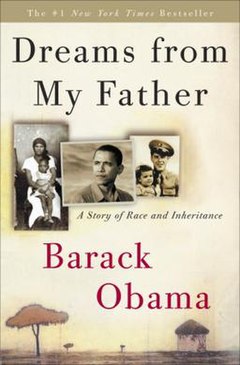Dreams from My Father
 | |
| Author | Barack Obama |
|---|---|
| Genre | Autobiography |
| Publisher | Three Rivers Press |
Publication date | 1995 |
| Publication place | United States |
| ISBN | [[Special:BookSources/ISBN+1-4000-8277-3+%28Paperback+reprint%29%3Cbr%3EISBN+1-56836-162-9+%28Paperback+1st+ed%29 |ISBN 1-4000-8277-3 (Paperback reprint) ISBN 1-56836-162-9 (Paperback 1st ed)]] Parameter error in {{ISBNT}}: invalid character |
| Followed by | The Audacity of Hope |
| ||
|---|---|---|
|
Personal
Illinois State Senator and U.S. Senator from Illinois 44th President of the United States
Tenure
 |
||
Dreams from My Father: A Story of Race and Inheritance is a memoir by current United States Senator Barack Obama of Illinois. It was first published in 1995 after Obama was elected the first African-American president of the Harvard Law Review, but before his political career began. The book was re-released in 2004 following Senator Obama's widely admired keynote address at the 2004 Democratic National Convention (DNC); the 2004 edition includes a new introduction by Senator Obama as well as his DNC keynote address.
Narrative
The autobiographical narrative tells the story of the future Senator's life up to his entry in Harvard Law School. He was born in Honolulu, Hawaii, to Harvard University-educated economist Barack Hussein Obama, Sr., of Kenya, and Ann Dunham of Wichita, Kansas. At the time of Obama's birth, both his parents were students at the East-West Center of the University of Hawaii at Manoa. Obama's parents separated when he was two years old and divorced when he was four. Obama formed an image of his absent father from stories told by his mother and her parents.
Ann Dunham Obama then married Lolo Soetoro, an East-West Center student from Indonesia. The family moved to Jakarta. When Obama was ten, he returned to Hawaii under the care of his grandparents (and later his mother) for the better educational opportunities available in Hawaii. He was enrolled in the fifth grade at Punahou School, a private college-preparatory school. Obama was one of three Black students among the majority Asian-American population at that school.[1] In an American school, Obama first became conscious of racism and what it means to be an African-American. At this point, his father came to visit him and his family; it was the last time that Obama would see him before his father's death in a car accident in 1982.[citation needed]
Upon finishing high school, Obama enrolled at Occidental College, where he describes living a "party" lifestyle of drug and alcohol use.[2][3] He transferred to Columbia College at Columbia University, where he majored in political science.[3] Upon graduation, he worked for a year in business. He then moved to Chicago, where he took up community organizing in the Altgeld Gardens housing project on the city's South Side. Obama recounts the difficulty of the experience, as his program faced resistance from entrenched community leaders and apathy on the part of the established bureaucracy. It was during his time spent here that Obama joined Chicago's Trinity United Church of Christ.[3]
In the book, Obama recalls a sermon by pastor Jeremiah Wright called "The Audacity to Hope," from which Obama would take the title of his second book.[4] Obama quotes Wright, describing the world as one "where white folks’ greed runs a world in need, apartheid in one hemisphere, apathy in another hemisphere … That’s the world, On which hope sits!" [5] [6]
Before attending Harvard Law School, Obama decided to visit relatives in Kenya. He uses part of his experience there as the setting for the book's final, emotional scene.
As well as relating the story of Obama's life, the book includes a good deal of reflection on his own personal experiences with race and race relations in the United States.
Recognition and awards
The audio book edition earned Obama the 2006 Grammy Award for Best Spoken Word Album.[7]
Columnist Joe Klein stated in an article about Obama for Time that the book "may be the best-written memoir ever produced by an American politician."[8]
The Chronicle of Higher Education listed the book as the # 1 bestseller at college campuses during the Spring 2008 semester. [citation needed]
Publication history
- New York: Times Books; 1st edition (July 18, 1995); Hardcover: 403 pages; ISBN 0-8129-2343-X
- This printing is now very rare. Only a few signed copies are known, and are estimated to be worth up to $5,000 (depending on condition).
- New York: Kodansha International (August 1996); Paperback: 403 pages; ISBN 1-5683-6162-9
- New York: Three Rivers Press; Reprint edition (August 10, 2004); Paperback: 480 pages; ISBN 1-4000-8277-3
- New York: Random House Audio; Abridged edition (May 3, 2005); Audio CD; ISBN 0-7393-2100-5; Includes the senator's speech from the 2004 Democratic National Convention.
- New York: Random House Large Print; 1st Large print edition (April 4, 2006); Hardcover: 720 pages; ISBN 0-7393-2576-0
- New York: Crown Publishers (January 9, 2007); Hardcover: 464 pages; ISBN 0-3073-8341-5
- New York: Random House (January 9, 2007); eBook; ISBN 0-3073-9412-3
References
- ^ National Center for Education Statistics, U.S. Dept of Education. "Punahou School Data". www.schooldigger.com. Retrieved 2008-02-08.
- ^ Obama (1995), pp. 93–94. see: Romano, Lois (January 3, 2007). "Effect of Obama's Candor Remains to Be Seen". Washington Post. Retrieved 2007-07-22.
{{cite news}}: Check date values in:|date=(help) Seelye, Katharine Q (October 24, 2006). "Obama Offers More Variations From the Norm". New York Times. Retrieved 2007-07-22.{{cite news}}: Check date values in:|date=(help); Cite has empty unknown parameter:|coauthors=(help) - ^ a b c Barack Obama ’83. Is He the New Face of The Democratic Party? Columbia College Today.
- ^ Anderson Cooper 360 - March 14, 2008 CNN.com
- ^ Obama, Dreams from My Father, pg. 293
- ^ Ben Smith's Blog - Politico.com
- ^ Brooks Boliek, Sen. Obama finally gets his Grammy, Reuters/Hollywood Reporter, September 6, 2006
- ^ Klein, Joe (2006-10-23). "The Fresh Face". Time. Retrieved 2006-10-19.
{{cite news}}: Check date values in:|date=(help)

